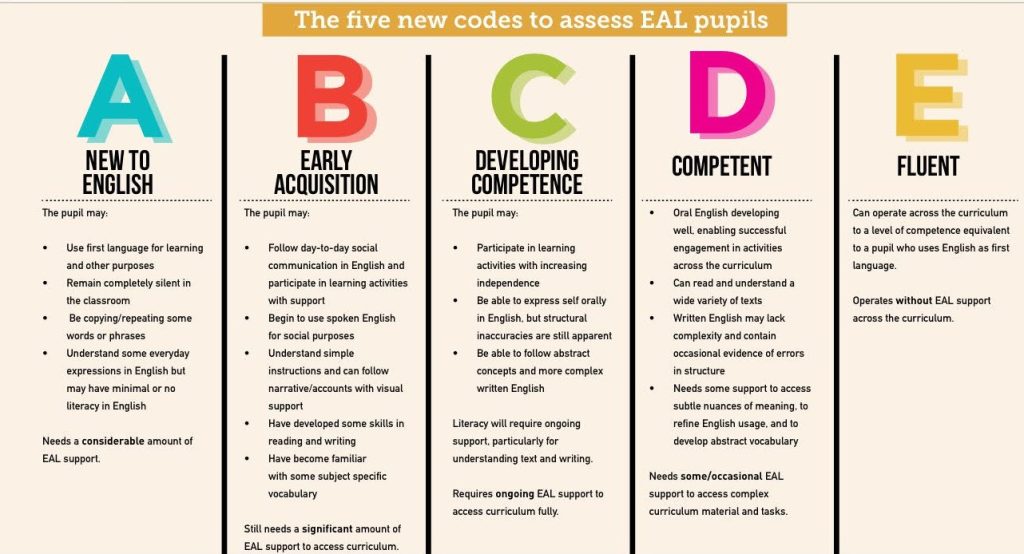English As An Additional Language (EAL)
Initial assessments
Vertical Support
In Class Support
EAL New arrivals are assisted by the EAL Coordinator and the Head Of Year; they are supported by the following:
- Meet and greet the New Learner, parents conference with the EAL Co and HOY.
- Identified bilingual adult to be introduced to the EAL learner.
- Partnered with the same background “buddy”/ mentor in school.
- Initial baseline Maths, Reading, Cognitive and Grammar skills tests to build up an EAL profile.
- Data collected to build up the English Proficiency profile/ILP.
- English Proficiency Code allocated; EAL profile completed and language targets identified.
- Specific interventions are carried out where appropriate such as : pre-teaching; guided writing sessions; specific English Grammar sessions; Reading and Comprehension sessions; spelling sessions based on phonic work.
- Specific literacy and English Grammar lessons taught based on the school’s SOL (National Curriculum for Literacy and English) to improve Listening, Speaking ,Reading and Writing skills.
- Review progress against targets and social interaction.
- New EAL arrivals and not only, are tested regularly, either annually or twice a year for Reading and Inference and Deduction using NGRT testing, age appropriate.
- Every 6 months Hodder testing is carried out to review (Fluency, Accuracy and Speed) progress for all EAL learners on English proficiency codes: C, D and E (where appropriate).
- EAL learners are grouped together in small groups for Grammar lessons, Reading and Comprehension, vertically across the timetable, according to language identified needs.
- Beginners are supported on a more 1:1 basis if no English knowledge is identified but not always.
- EAL learners receive support in completing homework either in a small group setting or they can have access to after school Homework club.
- Support for New Beginners/Non Speakers in terms of phonics-using the school`s spelling programme to learn about the phonic spelling rules using multi-sensory activities and tests.
- Academic support and catch up sessions to regain lost curriculum to improve knowledge in all areas of learning.
- Specific and detailed English language lessons (vocabulary,tenses,spelling, punctuation, writing skills) offered to all EAL learners following specific SOL.
- These are aimed at the specific developmental stage of the EAL learner, to allow progress through the Proficiency Codes.
- SMART targets set to support curriculum and classroom content.
- Language targets set to improve English language skills-Speaking, Listening, Reading and Writing.
- Review for beginners, intermediate or advanced EAL learners for their EAL Proficiency Assessment Framework ILP.
- Class teachers have access to the EAL learner`s Language profile to familiarise with the learners` language needs.
- Class teachers support learners using the Strategies and Ideas for Supporting EAL learners in KS 3 and KS4 booklet given to them to match class activities with the EAL need.
- The strategies are essential to improve the skills needed to complete curriculum activities.
- Strategies vary from strategies to support Speaking and Listening, to Reading, Writing and Teaching vocabulary to EAL learners.
- In class, EAL learners benefit from the use of the interactive board for shared reading activities.
- Teachers use age appropriate material to teach reading and writing.
- They employ screen reading software to enhance a learner`s access to text.
- Effective questioning to extend the learner`s understanding to enable access to lesson content.
- In class, EAL learners benefit from Talk frames,Writing frames, word mats and EAL planning sheets
- EAL learners benefit from laptops/bilingual dictionaries, Access Arrangements for formal tests/exams.
- Tracking progress in terms of achievement and attainment;
- Teachers liaise with the EAL Coordinator to convey information regarding progress.
Strategies to Support EAL Learners

Further Information
- Each word page on our website can be translated.
- Currently we have 317 EAL students
- 41 Languages spoken by our EAL students
Albanian (Shqip), Arabic (العربية), Bengali (বাংলা), Chinese (中文), French (Français), German (Deutsch), Greek (Ελληνικά), Hindi (हिन्दी), Hungarian (Magyar), Indonesian (Bahasa Indonesia), Italian (Italiano), Latvian (Latviešu), Malayalam (മലയാളം), Polish (Polski), Portuguese (Português), Punjabi (ਪੰਜਾਬੀ), Romanian (Română), Russian (Русский), Slovak (Slovenčina), Spanish (Español), Tamil (தமிழ்), Thai (ไทย), Turkish (Türkçe), Ukrainian (Українська), Urdu (اردو), Welsh (Cymraeg)
Access to translation tools such as:

